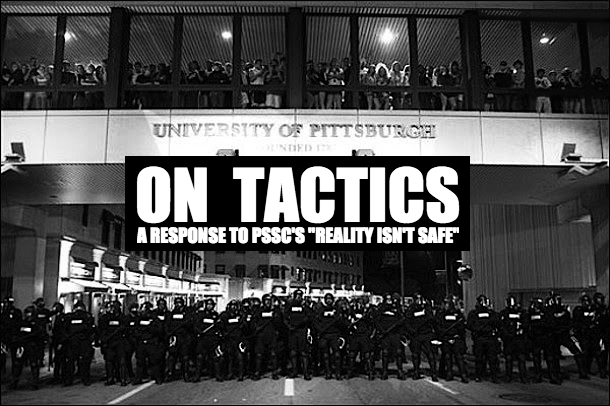
Dear Pittsburgh Student Solidarity Coalition,
Thank you for your invitation to those who wish to contribute to your discussion around the reprehensible Milo Yiannopoulos, free speech, and activism/organizing.
First I would like to congratulate you on your communiqué “Reality isn’t Safe”, the strength of which implies (I am far removed from Pittsburgh and Pitt currently) that the movement from which it arises is similarly strong.
However, I found the section “Our Position”, appearing at the end of the communiqué, distressing.
I urge you to consider pressuring the administration to ban rightist and fascist speakers from campus, or/and to stipulate that they must not be funded or offered campus space by the SGB.
Pushing for reform, for minimal or “liberal” demands necessitates pushing for maximal or “radical” demands. Forcing SGB to deny funds or a space to rightist figure-heads and sophists does not set a precedent for SGB to deny funds or space to leftists or anti-oppression groups. These funds and spaces are already closed to us.
The administration and the state already have the power to censor leftists as violent, or dangerous, or unreasonable, or etc. Look at the massive campaigns of censorship deployed against the BDS campaign, or the campaign of fear-mongering rightism against Pitt Students for a Democratic Society (my organization while I was a student at Pitt) in the early 2010s. [1] [2] // [1] [2] [3]
That you say you would march with Pitt Republicans for “human liberty” and “free speech” is distressing. The problem is that Milo, like Trump, is precisely not controversial (you say “Should the liberals succeed in ‘reforming’ the SGB and administration in order to censor controversial speakers, we will march side by side with the Pitt College Republicans to defend free speech”), but is entirely normalized. You spend a fair amount of effort arguing against this idea of controversy, indeed against the very rightist, obscurantist idea of “free speech” and “the marketplace of ideas”, and then turn about-face to defend these ideas once the threat of governmental or administrative intervention in defense of safe spaces appears.
Leftists have nothing in common with libertarians, and decentralization is a trap. Capitalism is decentralized; the State is decentralized. See Bob Black’s “The Libertarian as Conservative” for more on this, and I am sure that the Invisible Committee and Tiqqun would be skeptical of such wholesale rejection of, i.e. turning a blind eye to, apparatuses of power.
Which is all to say: forcing the administration’s hand is not legitimizing its existence or power. The administration is already fully legitimized; it already dictates arbitrarily, which is to say, in a manner (over)determined by power relations, what is and is not “free speech”.
The community you wish to organize, bottom-up, does not exist. At least it exists only as a reflection, a reaction-formation to the “top-down” administration.
Reliance on institutional recourse is not what divides liberals from radicals; rather, a mis-perception of the central antagonism of society on the part of the liberals is what separates liberals from radicals.
The antagonism between the State and the Community is itself constitutive of society, of the community. Liberals privilege the spectral community, conservatives the spectral state, but both are reaction-formations to the central antagonism (hence the obscurantist conservative position that liberals want a form of state socialism). Leftists must not fall into the trap of either side. The result of this is Blanquism.
The Student Government Board at Pitt, if I remember correctly, came out of radical student struggles in the 20th century as a concession, a “pressure valve for would-be dissidents”, as you say. However, this characterization, on its own, minimizes the actual impact the SGB has on everyday life. It is not just a pressure valve; it is a positive formation, a method of distributing bodies, affects, labor. It is unimaginable, in the reign of the “marketplace of ideas”, that this distribution could be specifically anti-fascist. If the liberals succeed in making the SGB anti-fascist, even in this minimal way, they have achieved the impossible, and achieving the impossible is a radical, leftist goal.
I think, finally, that you will not lose your radical accolades if you sit at the table with the liberals, or if you add to your own tactics the so-called liberal tactics of pushing for administrative censorship. You can fight for egalitarian and radical redistributions of power on campus while simultaneously fighting to censor fascists.
As an aside: please never march with the right wing. Their free speech is not our free speech; their freedom is not our freedom; their society is not our society.
In solidarity,
Liam Swanson
One Comment Add yours